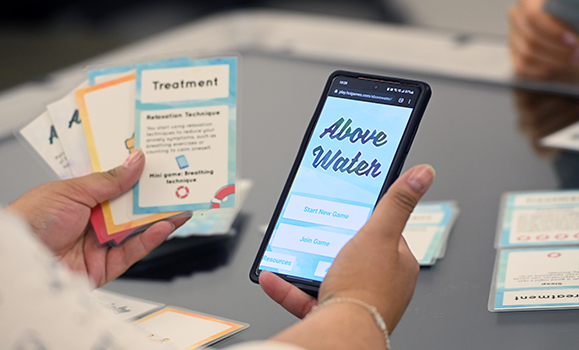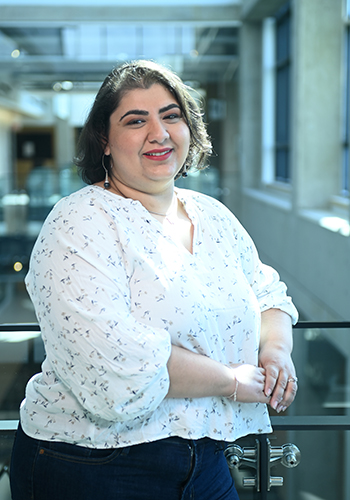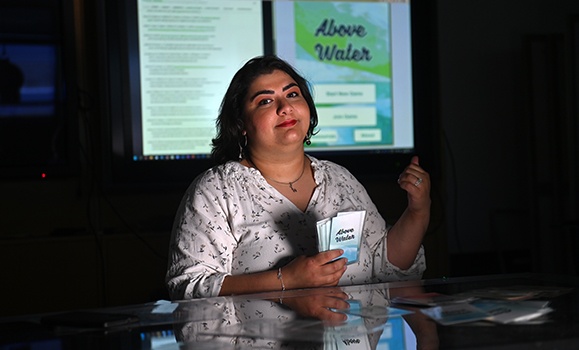A Dal computer scientist with academic roots in neuroscience has tapped into the power of gaming to help make a difference in the lives of people suffering with mental health.
Above Water, a mixed-reality (MR) game that uses both physical cards and a mobile app, aims to educate individuals about anxiety and help them set and achieve personal goals. It also seeks to strengthen communities and create environments that encourage pro-social collaboration.
Rina Wehbe, the game’s designer and an assistant professor in the Faculty of Computer Science, says she hopes the game will play a part in helping shatter the stigma around mental health disorders.
“We lose people to mental health all the time. It stops people from being able to live a happy life, being able to learn to be happy, and being able to grow as themselves. It really affects me to see all these talented people suffer, I want to make a difference and see everyone excel in life,” says Dr. Wehbe.

The path to purpose
Dr. Wehbe’s idea of using games to treat mental health was born, in part, from an early work experience. During her undergraduate, she had the opportunity to complete an internship with Interaxon Toronto where she worked on games for children with ADHD. From there, it was an easy decision for Dr. Wehbe to start exploring and designing digital games for children with attention deficit disorders.
 Another motivator was her own personal experiences. As a member of the LGBTQ2S+ community and a woman of colour, Dr. Wehbe has experienced discrimination and realized the effects it has on one’s mental health. Pursing equality for everyone has become an active goal for Dr. Wehbe as she aims to disable the oppressive systems she and others face.
Another motivator was her own personal experiences. As a member of the LGBTQ2S+ community and a woman of colour, Dr. Wehbe has experienced discrimination and realized the effects it has on one’s mental health. Pursing equality for everyone has become an active goal for Dr. Wehbe as she aims to disable the oppressive systems she and others face.
“Issues of equality, diversity, inclusion, allyship, and accessibility became important to me over my PhD, and I really saw opportunities to give back,” says Dr. Wehbe, who received her doctorate in Computer Science from the University of Waterloo.
“At times, it can be a struggle for people who have labels like mine. I really wanted to create a way for us as researchers to contribute to not only the state of the field of computer science to advance innovation, but also to advance humanity and help people,” she says.
Early on in her academic career, Dr. Wehbe realized the potential links between computer science and psychology, which eventually led her to pivot her area of study.
“I chose computer science because I love the versatility of it,” she says. “Computer science provides fluidity, the ability to make change, to make change quickly, and to apply it to so many different areas. A computer is a tool that you can use to solve problems in so many different ways. Computer science encompasses creativity, expression, freedom, and the ability to tackle different problems.”
Making a difference with tech
This choice ultimately led her to Dalhousie’s Faculty of Computer Science.
As an assistant professor, Dr. Wehbe continues to focus on mental health and community involvement. She recently started her own research group, “HCI4Good,” which challenges the status quo around labels and mental health with graduate students who share the same passion — using computer science for socially good outcomes.
When Dr. Wehbe created Above Water, she wanted to know if it was having an effect. To assess the game’s impact, she conducted a semi-structured interview study with expert participants: game designers and mental health care providers.
The , published in the Journal of Medical Internet Research (JMIR) Publications — a leading digital health research publisher, found that players of the game displayed a range of emotions, including anticipation, relief, and joy when discussing their game experiences.
It was clear that Dr. Wehbe's game was truly making a difference. She hopes to publish the game and post it online in the near future. (Those interested in the game can for more information.) And she sees it as a jumping-off point for further research.
“I plan to continue my studies on how physical and digital spaces interact and how we can continue to create games for health while creating more community involvement,” she says. “I’m really excited for what the future will bring.”

